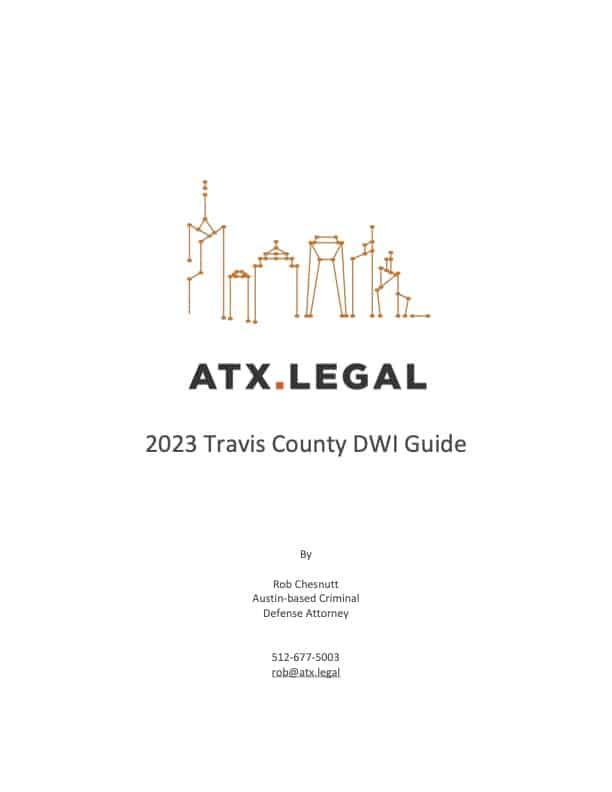2023 Travis County DWI Guide Part 6 Timeline and Process
One of the first questions I often get from potential clients is – how long will the process take? For many people, a DWI is their first contact with the criminal justice system. The unfortunate truth is – justice is slow. The total process could take a year or more. In rare cases, I can wrap up the charge in a month or two. The average DWI can take between 9-12 months to resolve. If accepted into DWI Court, the process can take 4-5 months. Of course, there are a number of factors that go into it, and every case is a little different. First, let’s go into the process. Why is it taking so long?
Lab Tests
One of the biggest holdups is lab tests. If there is a breath sample, we will get the result right away. If there is a blood sample, we might be waiting months. If drugs are suspected instead of – or in addition to – alcohol, the blood needs to be sent to a different lab and can delay things further. Typically, the prosecutor will not want to proceed before getting the lab results, as it will affect their plea offer.
Court Dates
In Travis County post-Covid, courts are far more lenient about in-person hearings. Although it is impossible to say whether this trend will continue, it has relieved a burden on many who are facing pending criminal charges. For many of my clients, they may be required to appear in court only for a plea – or they may not be required to come to court at all if we are able to get the case dismissed.
Keep in mind, if you have not hired an attorney, you will need to attend court in-person to speak to the judge about your plans to hire or get a court-appointed attorney if you qualify.
Always rely on your attorney to let you know if you need to appear. Travis County Court Administration will sometimes send text messages reminding my clients of court dates. This is a well-meaning attempt to keep people from missing court, but often leads to confusion. Many times my clients have received a text message about a court date that they do not need to attend, causing much stress and confusion. However, if you cannot reach your attorney and receive a text from the Court, you should heed it.
You can also check your case here:
If your next Court Date says “Appear”, then you will need to be present. One caveat here – the information on the docket is not always up to date, so if there is any confusion, it is best to contact your attorney or the court a few days ahead of time.
Mitigation and Classes
You might be wondering – while we’re waiting for the case to proceed, is there anything I can do to help my case? The answer is yes, most definitely! For almost every DWI plea – including dismissals – the prosecutor will ask you to complete DWI classes. This typically includes an “assessment” (2.5 hours), a MADD Victim Impact Panel (2.5 hours) and Education (typically 12 hours but can be more for class A and felony DWIs). These classes are typically part of you bond conditions as well, though many people overlook that. If you get started and complete these classes early, it can help a great deal with plea negotiations.
I recommend all my clients get started right away, because there is occasionally a waiting list to get started. The Assessment and MADD Panel are now virtual. As of this writing, the DWI classes can still be virtual or in-person, though I’m concerned that the virtual option may be taken away soon. A program like AA is not usually required, but if you are attending AA, be sure to get proof of attendance when you go.
Another way to help with plea negotiations is to maintain a clean IID – if you have one. IID violations can really hurt your case, but a stretch of clean IID reports can help very much. I don’t typically recommend voluntarily adding an IID, but sometimes this can help you get to a dismissal and is worth it. However, if the IID is a condition, make the best of it, by being extra-careful to keep from having a violation. One way I have seen many get in trouble is if they drink the night before and still have a positive reading in the morning. Remember, ANY amount of alcohol is a violation – not just over .08.
Why do Plea Negotiations Take so Long?
It is usually not in your interest to take a quick plea. Occasionally, there is a pressing need to plea quickly because of employment, travel or some other reason. In these cases, I can press the plea process forward, but it can sometimes result in a less-favorable plea.
By waiting, we can often make the case that the DWI was a one-time mistake that won’t be happening again. If the prosecutor sees that you are not a danger to society, we are more likely to get the deal we want. The passage of time itself helps to show that. However, I do listen to my clients and make the decision together to push forward quickly if needed.

